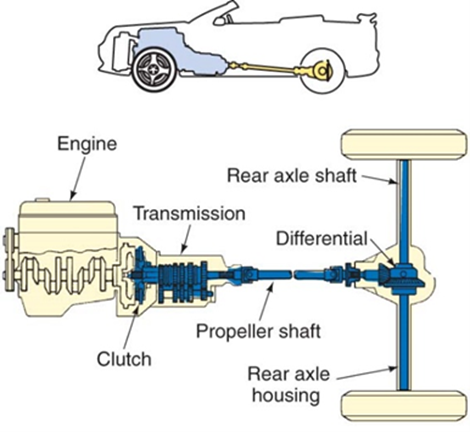The introduction to transmissions training at Universal Technical Institute (UTI) offers a comprehensive look into the foundational systems that make up a vehicle’s driveline and transmission.1
What You'll Learn in the Introduction to Transmissions Training
During the Introduction to Powertrains course, students will be taught about vehicle powertrains, including transmissions, driveshafts and differentials.

Course topics covered:
Diagnosing and Servicing Driveline Concerns
Students are taught to identify and address issues related to driveshafts, U-joints, differentials, and axle assemblies in rear-wheel-drive vehicles, ensuring these critical systems operate smoothly.
Manual Transmission and Clutch System Maintenance
This course provides in-depth training on diagnosing and servicing manual transmission clutch systems, flywheel and clutch control mechanisms, teaching students how to keep these components functioning at peak performance.
Introduction to Automatic Transmissions
Students will explore the basics of automatic transmission systems, learning to diagnose and service common issues such as fluid leaks and shift concerns.
Fluid Maintenance Procedures
Proper maintenance is key to transmission longevity. Students will perform regular fluid checks and replacements to prevent wear and extend the life of transmission systems.
Problem Identification and Root Cause Analysis
By learning how to identify potential causes of performance issues, students will develop the ability to troubleshoot and solve problems efficiently, ensuring vehicles operate reliably.
Learn All About Transmissions at UTI!
After completing the introduction to transmission training, students will have gained the knowledge and skills necessary to diagnose and service critical components in both rear-wheel-drive and automatic transmission systems.
This is just one part of the 51-week Automotive Technology program.7 For more info, visit our program page or connect with us today!
Frequently Asked Questions
The transmission is a crucial component of a vehicle's drivetrain that transfers power from the engine to the wheels. It adjusts the gear ratio between the engine and the drive wheels, allowing the vehicle to accelerate, decelerate and maintain optimal engine performance across various speeds.
Understanding transmissions is essential for diagnosing and repairing drivetrain issues, a critical skill for automotive technicians. With advancements in vehicle technology, modern transmissions have become more complex, incorporating electronic controls and sophisticated components. Learning these systems can help you become a versatile technician.
No prior experience is needed for the transmission courses, which are a part of the core Automotive Technology program offered at UTI. All skill levels are welcome.
Completing the introduction to transmissions course will equip you with the skills to diagnose and service both manual and automatic transmission systems, which is fundamental knowledge you should have in an automotive technician role.
The introduction to transmissions course is part of UTI's 51-week Automotive Technology program. This comprehensive program combines classroom instruction with hands-on lab experience, allowing you to gain practical skills and knowledge in less than a year.

